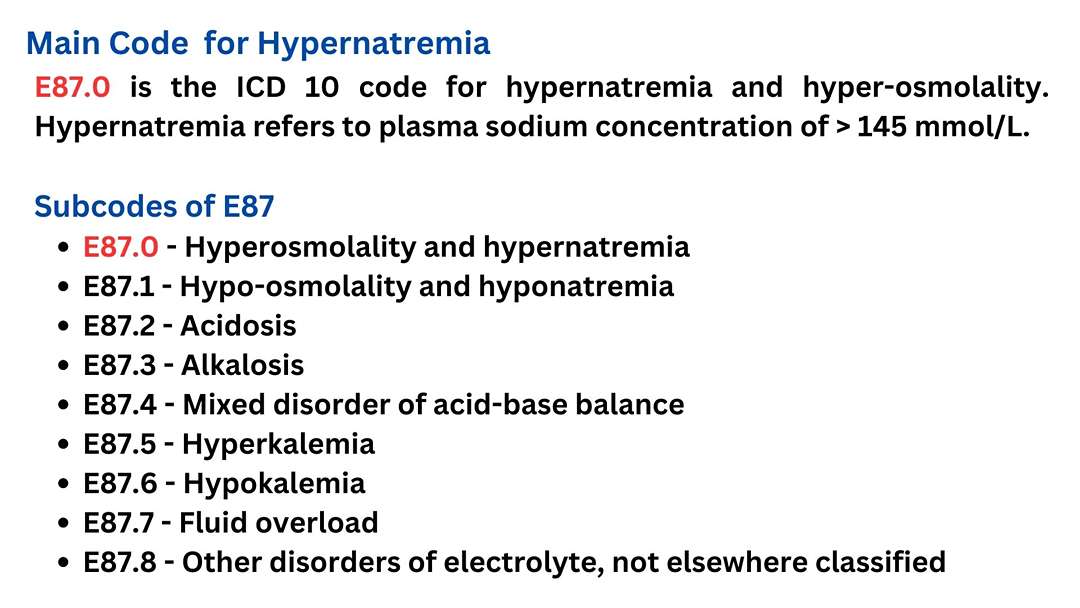
ICD 10 code for Hypernatremia
E87.0 is the primary ICD-10 code for hypernatremia and hyper-osmolality. Hypernatremia is a clinical disorder with a plasma sodium concentration of more than 145 mmol/L. It is mostly due to water imbalance rather than sodium imbalance. It is always associated with hyperosmolarity (hypertonicity). So all causes of hypernatremia give rise to a hyperosmolar state.
E87 ICD 10 code is related to Other fluid, electrolyte, and acid-base balance disorders. The sub-division code of ICD 10 code E87 includes:
- E87.0 - Hyperosmolality and hypernatremia
- E87.1 - Hypo-osmolality and hyponatremia
- E87.2 - Acidosis
- E87.3 - Alkalosis
- E87.4 - Mixed disorder of acid-base balance
- E87.5 - Hyperkalemia
- E87.6 - Hypokalemia
- E87.7 - Fluid overload
- E87.8 - Other disorders of electrolyte and fluid balance, not elsewhere classified
E87.0 ICD 10 code for Hypernatremia and Hyper-osmolality
E87.0 is the ICD 10 code for hypernatremia and hyper-osmolality. E87.0 is also the ICD 10 code applicable for hypernatremia in newborns and hypernatremia unspecified. E87.0 ICD 10 code is not applicable to Type 1 or Type 2 Diabetes with hyperosmolarity. ICD 10 code for Type 2 diabetes mellitus with hyperosmolarity without nonketotic hyperglycemic-hyperosmolar coma (NKHHC) is E11.00. ICD 10 code for Type 2 diabetes mellitus with hyperosmolarity with coma is E11.01.
Similarly, the ICD 10 code for Type 1 diabetes mellitus with hyperosmolarity without nonketotic hyperglycemic-hyperosmolar coma (NKHHC) is E13.00. ICD 10 code for Type 2 diabetes mellitus with hyperosmolarity with coma is E13.01.
Causes of acute hypernatremia
The causes of acute hypernatremia that developed within 48 hours are:
- Rapid infusion of hypertonic saline
- Rapid infusion of sodium bicarbonate
- Sea water intake
Causes of hypovolemic hypernatremia
The causes of hypovolemia hypernatremia are Renal salt & water loss i.e. Osmotic diuresis, diuretics abuse, salt-losing nephritis, and adrenal failure.
Causes of Euvolemic hypernatremia
The causes of Euvolemia hypernatremia are Central Diabetes insipidus and Nephrogenic Diabetes insipidus
Causes of hypervolemic hypernatremia
The causes of hypervolemic hypernatremia are
- Parenteral alimentation
- IV or oral salt administration
- Chronic kidney Disease
Clinical features of Hypernatremia
- Dizziness
- Delirium
- Weakness
- Coma & even death
Consequence of hypernatremia
Most of the clinical effects of hypernatremia occur due to cellular dehydration (especially cerebral dehydration). Signs & symptoms start at plasma sodium concentration > 155mmol/L. Initially, there is lethargy, headache, weakness, etc. At plasma sodium concentration >160mmol/L, usually there are drowsiness, confusion, convulsion, stupor, coma & even death.
Acute development (within 2 days) is more serious & death may occur at plasma sodium concentration >155mmol/L. Chronic development (by 3 days) is more tolerable & patients may remain conscious even at plasma sodium concentration 200mmol/L.
Treatment of hypernatremia
Treatment of hypernatremia depends on the rate of development of hypernatremia and the underlying cause. If the condition has developed rapidly, cerebral shrinkage may be acute, and correction with an appropriate volume of IV fluid is required. Then the underlying causes should also be addressed. IV fluid that can be used to correct hypernatremia are
- 5% DA (Dextrose)
- 0.45% NaCl (Hypotonic saline)

Comments (0)